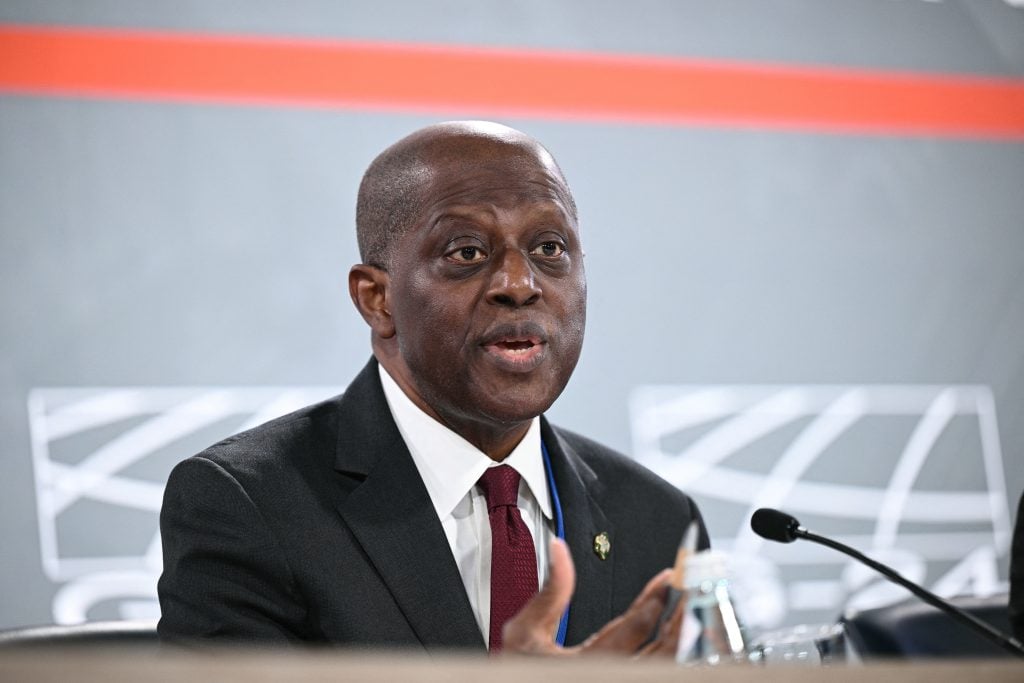
The room was packed, and almost a quarter of the guests couldn’t find seats, as the Nigeria Investor Forum kicked off at the Willard Hotel in Washington DC.
The event, held on the sidelines of the IMF/World Bank annual meetings, provided an opportunity for representatives of the Nigerian government and the Central Bank of Nigeria (CBN) to update investors on the outcomes of ongoing fiscal and monetary reforms in Africa’s most populous nation.
Cardoso encouraged by direction of travel
The summit followed the news of the IMF’s revised growth forecast for Nigeria – the country is expected to grow 3.9% this year and 4.2% in 2025.
In his opening remarks, Yemi Cardoso (pictured), governor of the CBN, who has helped to oversee tough reforms including the devaluation of the naira, said he was “encouraged by the progress made so far and (I) remain confident that the ongoing reforms are laying a stronger foundation for a resilient and globally competitive economy.”
Cardoso said that the CBN and the Ministry of Finance “have been working hand-in-hand to ensure alignment, stability and clarity for investors. Nigeria’s focus remains clear – strengthening our fundamentals, advancing reforms and unlocking opportunities for sustainable investment and growth.”
CBN sees inflation falling further
While critics say there has been an absence of palliatives to soften the impact of the harsh measures, Sani Abdullahi, deputy governor of economic policy at the CBN, said that a “market-driven naira supports the economy”.
He said the currency is “expected to remain stable thanks to improved foreign exchange supply, increasing oil production, growing non-oil exports, stronger remittances inflow and increased domiciliary conversions as well as a more efficient FX market and appropriate monetary policy stance.”
According to the deputy governor, that policy stance, coupled with enhanced policy coordination, improved allocation of fiscal spending, increased agricultural production, falling transportation costs and the transition to an inflation-targeting framework, has led to a deceleration in the headline inflation rate which fell from 20.12% in August to 18.02% in September 2025.
“We expect inflation to remain on a downward path,” he said.
He also touched on the emergence of “deeper and functional financial markets” buoyed by what he described as a “revitalised foreign exchange market” and deeper domestic bond markets.
Removing distortions
Sanyade Okoli, special adviser to the president on finance and the economy, said the “bold and comprehensive reforms embarked by the Tinubu administration over the past two years have removed distortions and laid a strong foundation for greater macroeconomic resiliency and positive economic outcomes.”
She pointed to economic and institutional reforms, including increased transparency at the CBN, strengthened security in agriculture and hydrocarbons, and phased adjustments to electricity tariffs.
Okoli said that reforms to the public finances, such as the removal of fuel subsidies, stronger oversight of ministries, departments and agencies, and new tax acts are also helping to turn the ship around.
“The authorities remain committed to prudent policymaking and the durability of the reforms, ensuring a lasting and positive impact on the economy and unlocking sustainable growth, development and prosperity,” Okoli concluded.
To read African Business’s special report on the Nigerian economy, click here.





Recent Comments